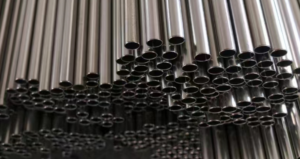The marine environment is a complex corrosive environment. In this environment, seawater itself is a strong corrosive medium. At the same time, waves, waves, tides, and currents produce low-frequency reciprocating stress and impact on metal components. In addition, the metabolites of marine microorganisms have a direct or indirect impact on the corrosion process. Indirect acceleration effect. In view of this harsh environment, Monel alloy with excellent corrosion resistance has become the first choice for many marine projects. In this article, we will analyze the seawater corrosion resistance of Monel alloy.

Analysis of Seawater Corrosion Resistance of Monel Alloy:
Monel alloy shows excellent seawater corrosion resistance in seawater environments with high salinity and high chloride ions, which is mainly reflected in the following aspects:
- The formation of passivation film. Seawater contains a large amount of chloride ions. Chloride ions in the aqueous solution for a long time can accelerate the corrosion reaction and easily penetrate the protective film on the metal surface, causing crevice corrosion and pitting corrosion. Because the Monel alloy contains nickel, it can form a dense passivation film in a complex seawater environment. This protective film can effectively prevent the chemical reaction between seawater and impurities, solutes, etc. inside the metal material, thereby improving the Seawater corrosion resistance of the alloy.
- The synergistic effect of nickel and copper. Monel alloy is an alloy based on metallic nickel. In addition to nickel, it also contains other alloying elements such as copper, iron, and manganese. In particular, the addition of copper and manganese elements enhances the strength and toughness of Monel alloy, improves the corrosion fatigue resistance of the alloy, and enables it to withstand the alternating load and stress of seawater.
- Resistance to stress corrosion. The structure of Monel alloy is single-phase austenite and precipitated by dispersed Ni3 precipitation phase. This structure makes the alloy insensitive to chloride ion stress corrosion cracking in seawater and is less likely to form tiny pits or cracks in corrosion-sensitive parts of the metal, reducing damage caused by corrosion.
Monel alloy is widely used in many marine engineering fields due to its excellent corrosion resistance. In the field of seawater desalination, Monel alloy is usually used in the manufacture of seawater desalination equipment. These equipments can remain stable in high-concentration chloride ion aqueous solutions, effectively preventing corrosion and damage to the equipment. At the same time, in the field of offshore oil exploration, Monel alloy is an ideal material for building drilling platforms due to its extremely high corrosion resistance and pressure resistance.
In addition, some marine engineering structural parts, such as submarine cables, underwater pipelines, offshore wind power equipment, etc., are required to have good corrosion resistance due to long-term working environments with humid and high salinity. Monel alloy component equipment can not only resist external corrosion, but also significantly extend the service life of the equipment and reduce maintenance costs.
Conclusion
To sum up, in the complex marine environment, the choice of materials is directly related to the safety and service life of the equipment. Monel alloy plays an important role in the development of various marine projects due to its excellent resistance to seawater corrosion.
Thank you for reading our article and we hope it can help you to have a better understanding of the seawater corrosion resistance of Monel alloy. If you are looking for Monel alloy suppliers and manufacturers online now, we would advise you to visit Huaxiao Alloy.
As a leading supplier of Monel from Shanghai China, Huaxiao Alloy offers customers high-quality Monel Alloys at a very competitive price.



